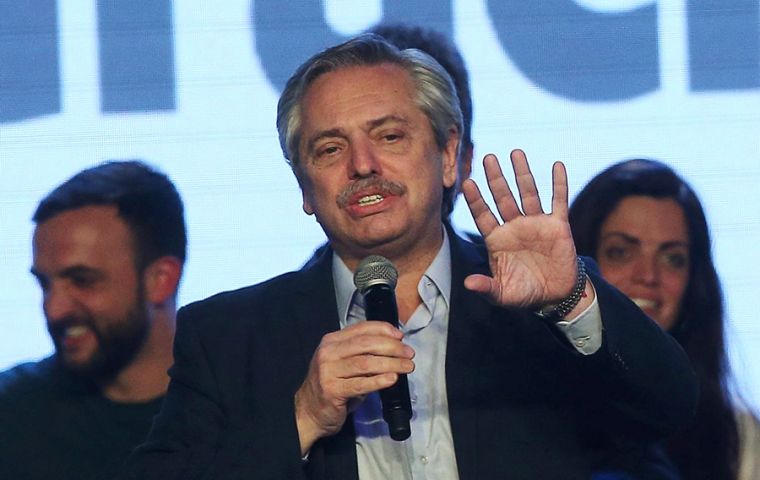MercoPress. South Atlantic News Agency
Argentina appoints team for talks with creditors to renegotiate massive sovereign debt
 The newly inaugurated administration of president Alberto Fernandez has already postponed payments on some of its short-term debt
The newly inaugurated administration of president Alberto Fernandez has already postponed payments on some of its short-term debt Argentina appointed a government team to kick off talks with creditors to renegotiate about US$100 billion in sovereign debt as the new center-left administration of President Alberto Fernandez postponed payments on some of its short-term debt.
The “external debt sustainability management unit” was created in the context of the government’s sweeping economic bill, which was passed by the Senate on early Saturday, according to a statement by the Secretariat of Finance.
The secretariat said it was inviting financial institutions and advisers to be part of a process that would allow “the recovery of external public debt sustainability.”
Fernandez, inaugurated Dec. 10, inherits an economic situation, including annual inflation of more than 50% and an economy that is expected to contract for a third straight year in 2020. In addition to trying to get the economy back on track, the government must steer debt revamp talks with bondholders and other creditors, including the International Monetary Fund.
Earlier on Friday, after 20 hours of debate, Argentina’s lower House approved the government’s so called Social Solidarity and Production Reactivation economic plan, which includes an array of tax increases on grains exports, personal property and foreign assets held abroad. Early Saturday the bill was passed 41 to 23 votes in the Senate.
The cornerstone of Fernandez’s program, the law aims to maintain fiscal balance to guarantee the future payment of public debt and, at the same time, expand social spending to boost the economy as Argentina struggles with higher poverty and increased unemployment.
Also on Friday, the government said it would postpone payments on some short-term notes known as “Letes” until Aug. 31, 2020. About US$ 9 billion in such payments due to expire from Friday would be affected..
The postponement did not come as a surprise, according to Nikhil Sanghani, a London-based economist at Capital Economics, but longer-term concerns still linger for investors.
“The government has merely kicked the can down the road and maturity extensions alone will not be enough to resolve the debt problem. We think that it will have to pursue a large debt write-down next year,” Sanghani said
Fitch downgraded Argentina to ‘RD,’ or “Restricted Default,” a credit rating applied to borrowers that have defaulted on one or more of its commitments while to continuing to meet others.




Top Comments
Disclaimer & comment rules-

-

-

Read all commentsThe new law passed (clearly unconstitucional) in one day (if, you have correctly read, passed in a single day) involves taxes to the Argentine Middle Class, export taxes, unconstitutional freezing of the incomes to retirees (in a country with 50% inflation) y cancellation of taxes to financial income. Clearly, the weight of the adjustment will fall in the most unprotected middle class sectors and the productive sectors of the country.
Dec 23rd, 2019 - 02:09 pm +1This will allow the Government to show itself as a “disciplined student” to the IMF with the intention of additional credits and financing. Not bad, but this shows the true nature of Peronism when it is in power (J.D. Peron, C. Menem, N. Kirchner, all of them ruled the country with “super-powers”).
The IMF will surely object to the lack of reduction in public spending (this tax increase will allow to collect between 1/2% of GDP covering the current fiscal deficit of 1.5% left by Macri). Clearly, it is impossible to think of economic recovery with such a tax burden. Let's wait to see what happens...
Or to put it another way, we can't support a state that sucks in more that 40% of our GDP but produces nothing. All at the expense of senior citizens, SMEs and the working middle class.
Dec 23rd, 2019 - 03:10 pm +1I would just love to really how much of what the state collects actually reach the really needy ones. I bet that trying to dig deeper into this matter could just get you killed.
EM
“Finally, Argentina got rid of the highway robbers' gang and voted in a real government team.”
You sound like we now had Mother Theresa in the government. Oh you silly cow ...
Good old Boris passed a law in a day then suspended parliament for five weeks so no one could argue, until some days later the Supreme Court ruled it “null and void”.
Dec 23rd, 2019 - 03:24 pm +1Increasing taxes on the middle classes is probably the only way of getting more money in. Taxing the rich is chasing rainbows.
We had a 50% tax bracket introduced for people earning over £80K p/a, so not exactly the superrich, some years later it was scrapped costing more to collect than it was collecting in. 90% of the people in the tax bracket had dropped out.
Getting a functioning/growing economy is the only way to create wealth, otherwise you are simply taxing then borrowing (when there is nothing left to tax) money, to pay people, to be poor, not that much probably gets to them.
Becoming President does seem to be a good way to get very rich in Argentina, irrespective of how the economy/people are faring.
Commenting for this story is now closed.
If you have a Facebook account, become a fan and comment on our Facebook Page!